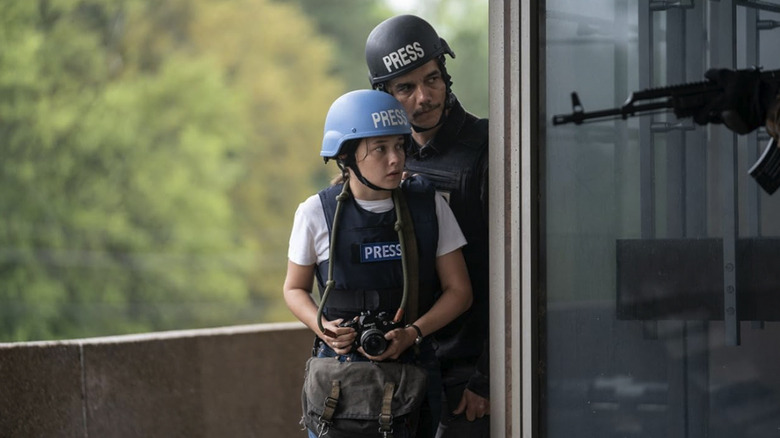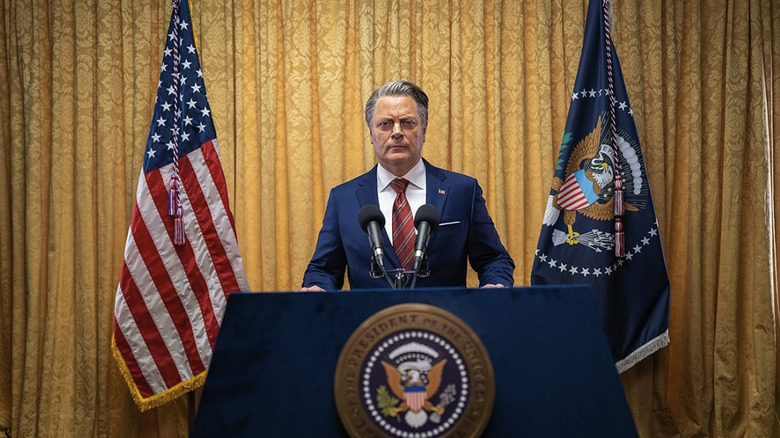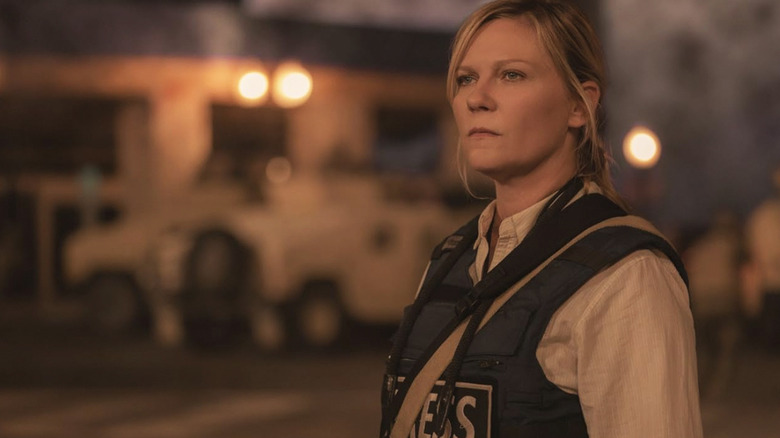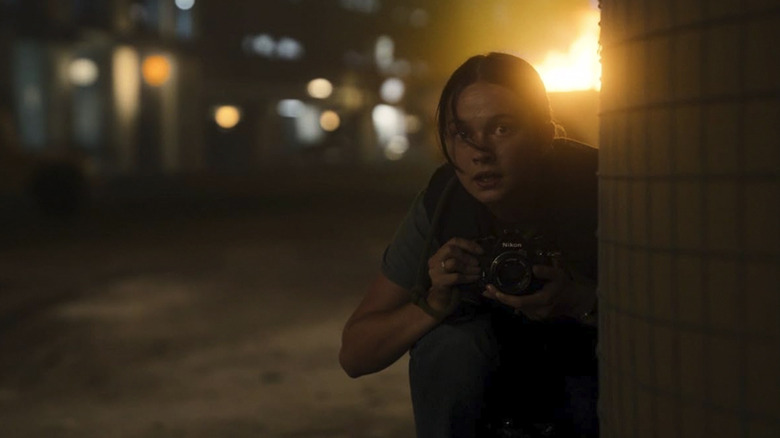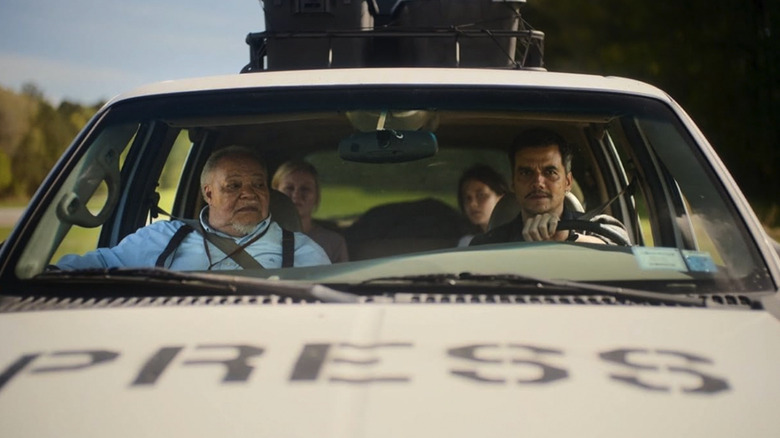Civil War Director Alex Garland Explains Why The Movie's Gunshots Sound So Horrifying [Exclusive Interview]
"Civil War" is a film designed to trouble you, to dig under your skin, and to inspire fierce debates among you and everyone else who has seen it. In other words, it's an Alex Garland film.
While this alternate history war epic is bigger than anything he has made before, it's undeniably a Garland film. The obsessions that power films like "Ex Machina," "Annihilation," and "Men" are present here, even if they're presented in a different manner than we've seen before. His ongoing interest in mutation and transformation reaches its apex — this is a portrait of an entire society undergoing violent and terrifying change, not just a handful of people or a few locations.
Because his films are often challenging and brainy, you'd think Garland himself would make for an intimidating interview. And he does. But he's friendlier and more open than you'd expect: The filmmaker, filled to bursting with terrifying visions of the present and future is approachable, is eager to discuss and dissect his work, and happy when others have takes on his films that he didn't even think about (as you'll see in the interview below).
I recently spoke with Garland over Zoom about the making of "Civil War," the film's very specific POV, the subjective nature of his filmmaking, and why the movie's sound design is so damn scary.
Note: This interview has been lightly edited for clarity and brevity.
'I think also social media has accelerated and changed the terms and the space in which journalism sits'
"Civil War" feels like to me a historical film from an alternate universe, where it expects you already understand the basics of the war, kind of like how "Saving Private Ryan" and "Dunkirk" don't need to tell you how World War II started. Do you view it this way?
I think you could extrapolate how this came about from bits of information contained within the film, personally. I also think that the film doesn't come out of nowhere, it comes out of a sense of anxiety about the nature of populist politics, division, and extremist behavior as well as extremist thinking, and I think that's pretty shared, actually. I think a lot of people feel that, and they have their own internal sense that they already arrive with about why that exists. Now, people might not agree that their versions or account of how that might exist might differ, but the anxiety I think is quite broadly shared, so I'm also relying on people's own sense of a situation as well as things that are marked within the film itself.
I think one of the more surprising things about the film is that some people, myself included, expected the premise to lead to more political grandstanding, but instead the film exists in an almost ... I don't want to say neutral place, but a place where the suggestion is that once the violence starts, once the bullets are flying, the reasons don't matter as much because people are dying. Was that always your intention — that once the war starts, political intent no longer matters?
It's partly that. That's definitely part of it. I think it's true that sometimes combat, it loses its reasons to exist quite quickly and then becomes just about things like staying alive, or not being killed, or killing the person who's trying to kill you, and it can just fold down into that state. But there's something else, actually, on a personal level there's something else, which is really to do with journalism, and it's to do with — and this is a product partly of me being middle-aged, I think, but it's to do with an old-fashioned form of journalism, which was reporting, and bias in the terms that you mean it, which I think grandstanding implies bias. That was not permitted within a certain kind of news reporting as an ideological position. The ideology being connected to a belief within journalism that journalism needed to be trusted. If it was overtly propagandist, it would be defeating its own aims, and its aims were societal.
It was to be a check and a balance and holding a government to account, and in order to hold a government to account when a government is corrupt — which governments will do, they will at times be very corrupt — in order to hold them to account, you have to be trusted. That has certainly been eroded. It's been eroded because it's been under attack deliberately by politicians who seek to erode it for their own reasons. I think also social media has accelerated and changed the terms and the space in which journalism sits, but it's also because many journalistic institutions have completely abdicated that responsibility and have tilted hard towards bias, which means tilting hard towards propaganda. They do that because they're trying to maintain an audience, and the audience needs to be maintained as a relationship with advertising, so money. A consequence of that — there are various consequences, but one of them is they might be trusted by the choir they're preaching to, but they're not trusted by any of the other choirs, and so a generalized sense of distrust in journalism starts to exist.
That concerns me. I don't like it. I grew up around journalists. I know they can be spiky or conflicted or compromised or any number of different things, but that we really need them. There's a difference between the role they play and what they might be like as individuals, they're just not the same thing. I want to trust journalists. The film attempts to function like old-fashioned reporters and, in a way, what old-fashioned reporters would do — not that they don't exist anymore, they do, it's just they exist surrounded by this noise, which diminishes their traction. What they would do is, in a sense, say, "This is what I observed." Then, it would be up to the reader in the old days, or the viewer, to take their own meaning from that, but what they didn't do was distrust what the journalist was saying they observed. Do you see what I mean?
'These are machines that are constructed to kill'
I do, and that reminds me of the moments in the movie that really stuck out to me, where the journalists are seen interacting with characters from all sides of the conflict. They share cigarettes, they embed themselves, there is no sense of "this is the team we're rooting for," it's a sense of "this is where the story is and we're going to follow it."
Exactly, because as journalists, they would be abstracting themselves from rooting. They're not interested in rooting, they're actually — in fact, one of the comments on this at a certain point, what we do is observe it so other people are asking questions in a certain kind of way. The film is attempting to function something like that.
You've spoken in various Q&As and interviews about the idea of not romanticizing the war, and not making it feel exciting. There really is a horror element to how the gunfights and the battle sequences play out, especially in the sound design. I would love to know the conversations you had with your sound designers and mixers to guarantee that those bullets never sounded exciting. They always sounded terrifying.
I'm actually very pleased you said that. The answer is that a gun sound is, in a way, terrifying. A modern automatic rifle or machine gun or 50-caliber machine gun, whatever it happens to be, these are machines that are constructed to kill. That is what they're there for. They do this in this incredibly efficient fashion, and there is something sinister in the noise of something that really only exists for that purpose. So what we did was we used exactly those noises. We used guns that fired blanks, and we put full flash blanks in them and we recorded that noise as faithfully as we could. That will include the sound of the gun, but also the way it reacts with objects around it.
A huge effort in the film related to reality and the grammar of either lived experience or news photography or documentaries. We were doing that in many, many ways throughout the film, but hugely to do with sound design. Where something happened that meant a bit of recorded noise didn't work for one reason or another, it can be to do with the distortion, it spikes too much or it fritzes or whatever, we would then just record real guns firing and use that. Film, sometimes we'll do little tricks to do with using sub bass or extra noises, and what those extra sounds do is they slightly distance you from the stark, aggressive sound of an automatic weapon firing. Film has a way sometimes of being subtly reassuring within the context of action or violence, and what we did was, where possible, tried to remove those reassurances as much as possible.
'Scenes in films that I make that might seem very surreal or dreamlike or strange, I think are, in a way, representations of reality'
Across your filmography, there's this ongoing interest in the transformation and mutation of people, nature, technology. In "Civil War," there's a transformation or mutation of an entire nation and society. Do you see this as a direct correlation or extension of your previous ideas?
That's an interesting question. I think it probably relates to all of the others. I think that the only thing is I'd probably frame it slightly differently in my own mind, for whatever that's worth, which is it's more about how subjective everything is, that we perceive it as being objective because we are seeing through our eyes and we are having our responses and we attribute truth to those things, sort of factual reality to those things. But I think everything is just much more subjective than it seems to be. Actually, polarization is, in a way, a demonstration of that, because I think sometimes people in polarized states are not actually — I'm not talking about everybody, I'm talking about some people within polarized states — are not exactly bad people, they are just people who cannot conceptualize the other side of the argument. That is a consequence of subjectivity [laughs], if you see what I mean. And so what I'm trying to do often is walk towards subjectivity, because I think it's there, and exist within it.
Scenes in films that I make that might seem very surreal or dreamlike or strange, I think are, in a way, representations of reality, however strange that might sound. I can give an example of it in "Civil War," where there's a scene in "Civil War" that takes place around a bunch of abandoned Christmas decorations from a Christmas fair, which looks like a self-conscious bit of surrealism that has been created by a production designer and inserted into the film, but actually we found all that stuff abandoned in a field about 100 yards from where we shot it. We just dragged it 100 yards further up the road for various reasons. That thing, you are driving through Georgia in early summer, and then you find a bunch of abandoned Christmas stuff — a polar bear, a penguin, and a weird box that has mannequins in it that is loosely set up to look like maybe a nativity scene or something like that — that is the weirdness of real life. It's not a bit of surrealism, it's a bit of realism, bizarrely.
(Editor's note: The next two questions deal with the film's ending, and while they don't contain direct plot spoilers, those who haven't seen the film may want to tread lightly.)
I don't want to spoil the film for anybody who's reading this, so I'll dance lightly here. But in a way, this film is building toward what feels like the most famous photograph in this fictional history. The film's climax is about a photograph that surely everybody in this alternate universe has seen, every history textbook has it, it was seen all over the news, everybody knows it. Was it always your intention to build toward a photograph that has the weight of something monumental?
Do you know what? I wish I could say yes, because that's such a smart idea. [laughs] It would be such a sort of neat resolution to the film in a kind of themic way. That had never occurred to me until you stated it. I was just showing war photographers doing what they do, or actually just press photographers doing what they do, and because they're good at what they do, they capture iconic moments. That's a much more elegant version of that, and I would love to lay claim to that. [laughs] I'd love to be able to say that, but I can't because I'd be bullsh*tting. But well, what can I say?
Well, you can have it. It's yours now.
Do you know what? I'm just going to say: It's not mine, it's yours. That is one of the things that really interests me in this subjective thing, in this offering up narratives and people bringing themselves to the narrative, that is actually a perfect example of what I'm talking about. If I do anything as a filmmaker, I do deliberately leave space for that. I know it's going to happen anyway. When I say I lean towards subjectivity, that is the thing I'm leaning towards, is to do with space, to do with leaving imaginative or thoughtful areas for someone to inhabit.
'The moment it walks out into the world, I feel very divorced from it'
My last question is maybe a smidge off-topic. Now that you've had some distance from its release, your previous film, "Men." I'm a fan, but I know the reaction was mixed. I'm wondering if enough time has passed for you to process the reception and how people reacted to that film.
The truth with that is that ever since I started working, which was a book, it was a novel, it wasn't a film, called "The Beach." Number one, this difference between the intention of something and the way it's received was made really clear to me, because I wrote a book that in my mind, it was various things, but it was also slightly critical of a backpacker scene, and then I could see it was being treated as a celebration. That was made very clear to me very early. But the other thing that was made clear to me was before writing it, I would've anticipated something like a sense of ownership or pride or a reward as an internal state from having done something like written a book. That's what I would've imagined happened. I have a very clear memory of walking into a bookshop after it was published with the intention of seeing it, that's why I was going into the bookshop, and then seeing it in the bookshop and expecting something to happen where I felt affected in some ways. I imagine I would've guessed pride.
But I felt completely neutral. I felt absolutely nothing at all. I was quite dismayed by it and quite surprised, actually, and that's never left me. I think it's a personality quirk. I work really hard on something, I really care about it while I'm doing it, and I get obsessive, actually. I get very, very obsessive about the thing while I'm doing it. I can't really escape from it. The moment it walks out into the world, I feel very divorced from it. It could easily be made by someone else. So when you ask me about "Men," about how I see it now, it fits into that category, which is the same category as all of the other things. They're a product of a fixation. I think I've been lucky in my working life that I've been able to not really worry about commercial considerations too much and I've been allowed by financiers to make some slightly odd projects that don't, on the face of them, make sense.
So I feel very fortunate, but also quite separate because the fever is broken. At the point it's done, it's like the fever breaks, something like that.
*****
This interview appears on today's episode of the /Film Daily podcast, along with a conversation about the movie between a few /Film staffers. Check it out below:
"Civil War" is in theaters now.
